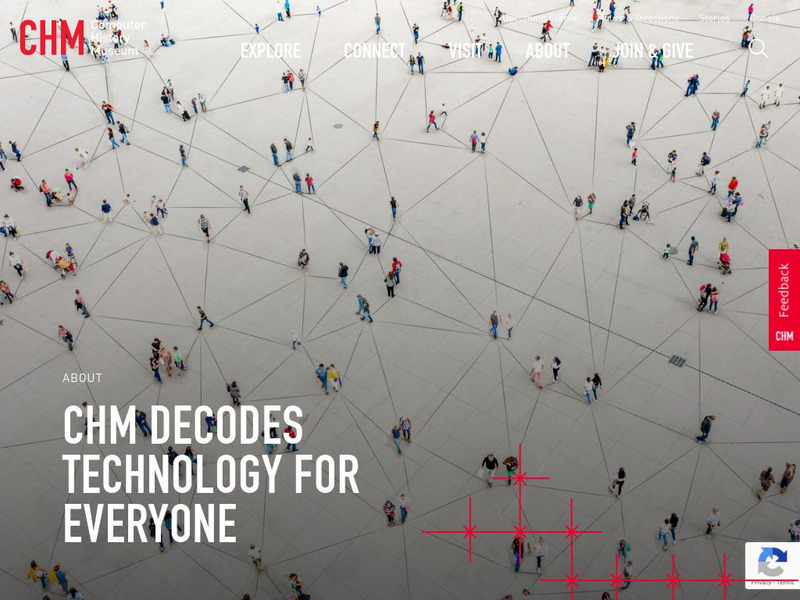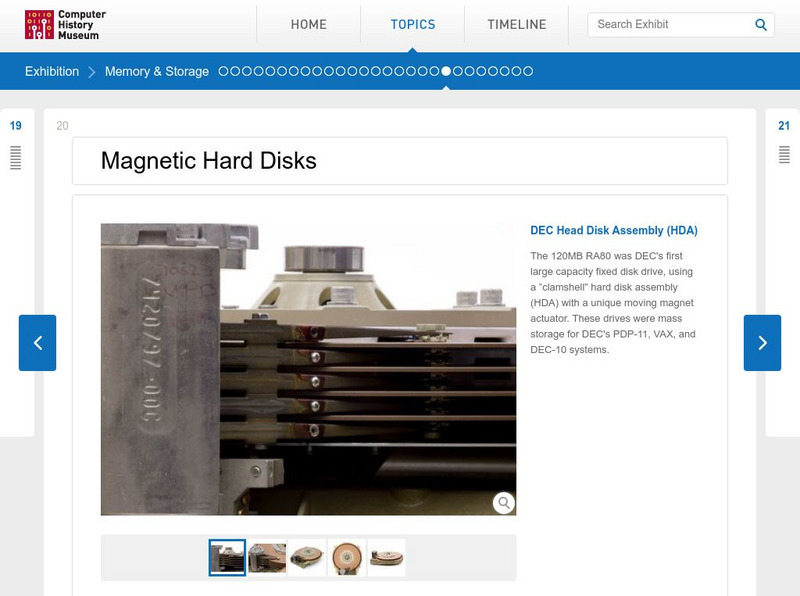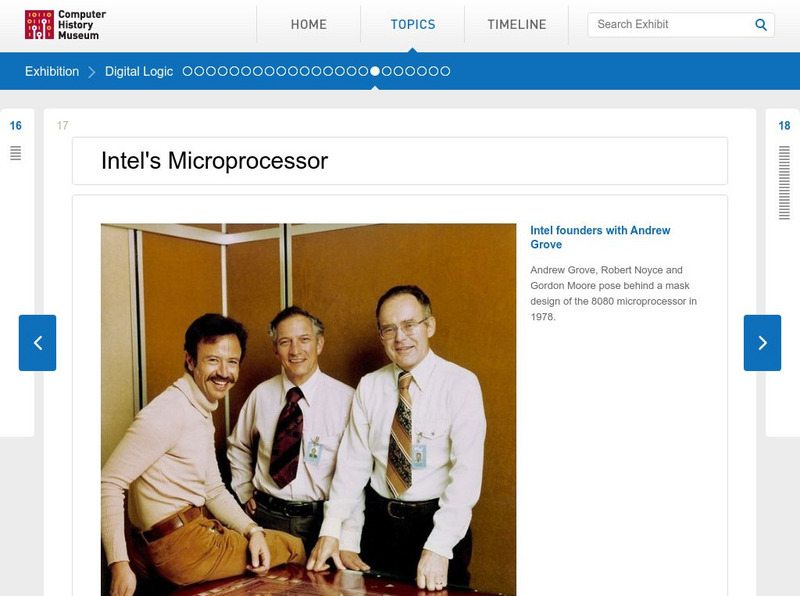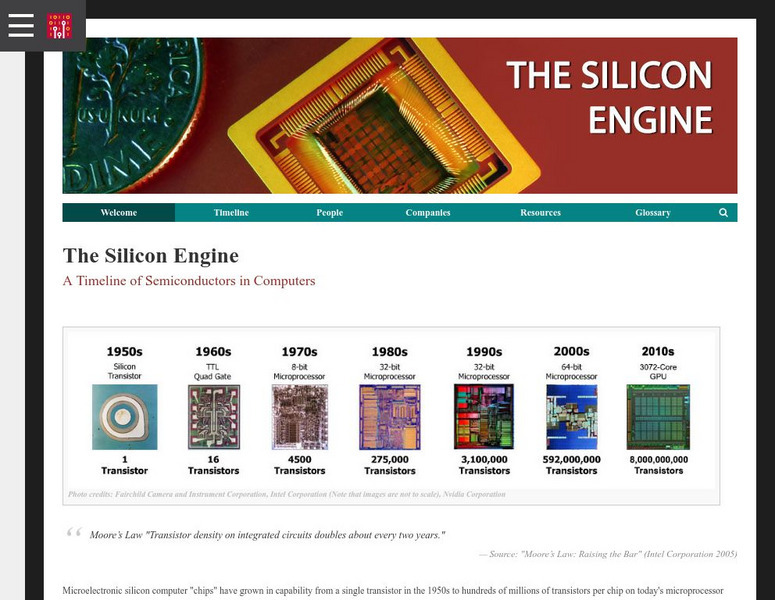Computer History Museum
Computer History Museum: The Babbage Engine
Charles Babbage (1791-1871) was a computer pioneer who designed the first automatic computing engine. Trace the history of the many computers he designed and how they worked. View a video [1:39] of Difference Engine No.2, in operation.
Computer History Museum
Computer History Museum
This site includes a variety of exhibits, an artifact repository, special events and publications.
Computer History Museum
Computer History Museum: Core Memory
Brief description of Core Memory, a reliable high-speed storage device developed during the 1950s. The various memory artifacts are on display at the Computer History Museum. This site provides a glimpse into the development of the...
Computer History Museum
Computer History Museum: Magnetic Tapes
A brief history covering Magnetic Tapes, initially used in the 1950s to replace punched cards, and used primarily today as a backup device. The artifact is on display at the Computer History Museum. This site provides a glimpse into the...
Computer History Museum
Computer History Museum: Delay Line Memory
Brief description of Delay Line Memory, a slower serial based design. This site provides a glimpse into the development of the information age from their large collection warehoused in the Computer History Museum located in Mountain...
Computer History Museum
Computer History Museum: Williams Tube Memory
Brief description of Williams Tube Memory, the first randam-access memory used by many first generation computers. The various memory artifacts are on display at the Computer History Museum. This site provides a glimpse into the...
Computer History Museum
Computer History Museum: Microprocessors
The invention of the microprocessor is a very important milestone in the digital age. This site presents a timeline that illustrates the history of the microprocessor from 1971 through 1996.
Computer History Museum
Computer History Museum: Model 7094 Console
Brief description of the Model 7094 Console, a transistor computer used in the NASA Apollo space program. The machine is on display at the Computer History Museum. This site provides a glimpse into the development of the information age...
Computer History Museum
Computer History Museum: Magnetic Disks
A brief history covering magnetic disks, developed as efficient random access memory device. Additionally, a discussion on how a disk drive works is provided. The artifacts are on display at the Computer History Museum. This site...
Computer History Museum
Computer History Museum: I Cs, Microprocessors, & Memory
Brief description of ICs, Microprocessors, and Memory, describing the breakthroughs in technology design that dramatically reduced the size, power requirements, and cost of a computer. The various Integrated Circuit artifacts are on...
Computer History Museum
Computer History Museum: Integrated Circuits
Brief description on the design of Integrated Circuits along with images showcasing the assorted types. The various Integrated Circuit artifacts are on display at the Computer History Museum. This site provides a glimpse into the...
Computer History Museum
Computer History Museum: The Silicon Engine
Microelectronic silicon computer chips have provided the growth engine for the technology revolution. This site provides a wealth of information about the development of semiconductors. Included is a timeline of major events, a list of...
Computer History Museum
Computer History Museum: Restoring the Dec Pdp 1 Computer Exhibit
Digital Equipment Corporation (DEC) introduced the PDP-1 in 1959. It represented a radical shift in the philosophy of computer design. This site presents the history of the PDP-1, the people that worked on the PDP-1 project, how the...
Computer History Museum
Computer History Museum: Selling the Computer Revolution: Marketing
This site presents a collection of marketing brochures from the computer industry. The collection can be viewed by company, decade, computer application or software category.
Computer History Museum
Computer History Museum: Mastering the Game: A History of Computer Chess
Exhibit documenting the important advances in hardware and software that made computer chess a reality.
Computer History Museum
Computer History Museum: Timeline of Computer History
This site presents an interactive timeline of computer development from 1939 through 1994. Upon selecting a year, the site presents all of the major computer hardware and software developments that occurred during that year.
Computer History Museum
Computer History Museum: The Origin of the Internet
The origin of the Internet can be traced back to the ARPANET project allowing scientists to share information between computers. As the popularity grew advancements were made in usability. This site provides a glimpse into the...
Computer History Museum
Computer History Museum: Charles Babbage
Considered by some to be the "father of the computer", Charles Babbage was a 'gentleman scientist'. Learn interesting facts about his personal life and his career.
Computer History Museum
Computer History Museum: An Overview of the History of the Software Industry
The software industry is a major part of the world economy. This site traces the relatively short history of the software industry, from the 1950s through the 1980s.
Computer History Museum
Computer History Museum: Abacus
The Computer History Museum located in Mountain View, California, provides a glimpse into the development of the information age via their large collection of artifacts. This section highlights the development and use of the abacus, "a...
Computer History Museum
Computer History Museum: Early Apple Business Documents
Apple, Inc. has played a major role in the personal computer and digital device market. This site presents some of the early documents in the company's history such as the Preliminary Confidential Offering Memorandum and the Preliminary...
Computer History Museum
Computer History Museum: Ada Lovelace
Explore the life and work of Ada Lovelace who has been referred to as the 'prophet of the computer age'.





















